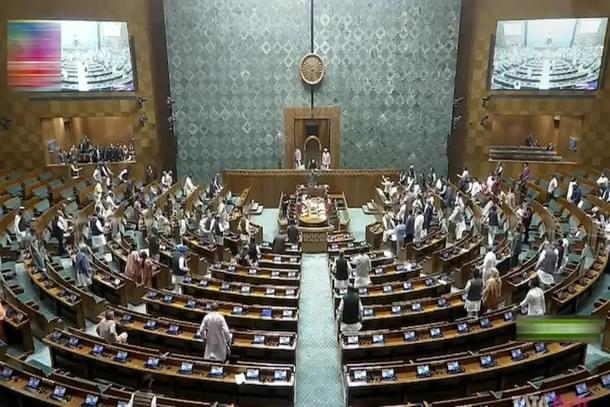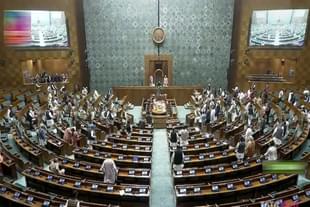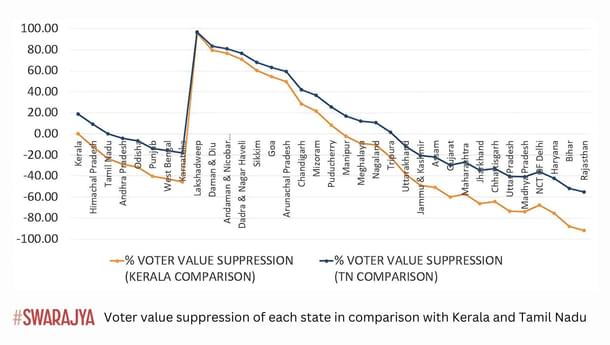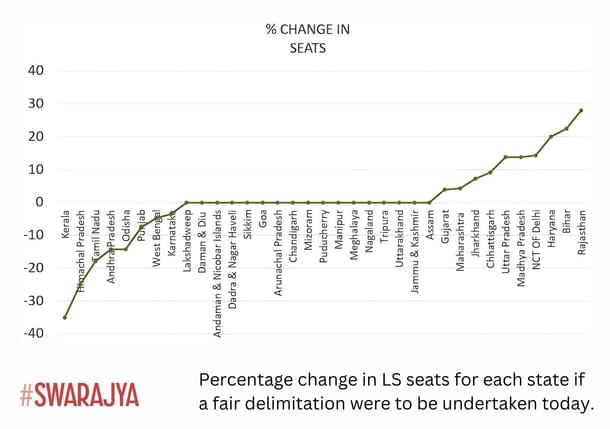Politics
Delimitation: Tail Wags The Dog?
M. Seetharam
Mar 03, 2025, 12:12 PM | Updated 11:52 AM IST
Save & read from anywhere!
Bookmark stories for easy access on any device or the Swarajya app.


Union Home Minister, Amit Shah, made an announcement on 26 February, in Tamil Nadu, that the seats allocation to each state under the anticipated delimitation would NOT happen on a pro-rata basis. The delimitation is expected to follow the Census in 2026.
In this announcement he referred to a similar statement made by Prime Minister Narendra Modi on an earlier instance.
In this brief post, I will examine the backdrop of this decision and argue with data to convince the readers that this decision is a dangerous surrender to the vocal few and comes at a great cost to all others and the nation.
Data and Methodology
I have used the 2001 and 2011 official census population data for each state to calculate the decadal growth rate for each state. I have then projected the population for 2025 from the 2011 data using the calculated growth rate for each state.
All the data and trends in this post will be based on those projected population numbers.
The current 543 Lok Sabha (LS) seats are divided among the states on the basis of the 1971 census. Decades have rolled by and the changing demographic profile of the nation has in turn created a situation today where the voters in a few states are getting the privilege of a significantly higher value for their vote.
This privilege is extracted by suppressing the rightful value of the votes in a vast majority of other states that are condemned to be ruled by less savvy and driven politicians (unlike Tamil Nadu).
A simple analysis of the projected 2025 population and the current seat allocation in Lok Sabha reveals the magnitude and extent of this voter value suppression.
A vote cast by a voter in Kerala today carries 70 per cent higher value than a vote cast in Uttar Pradesh.
While Tamil Nadu has 0.45 LS seats per lakh of its population, Rajasthan only has 0.29 LS seats per lakh of its population – more than 50 per cent lower value for every vote cast in Rajasthan relative to TN.
The central government has promised to protect this privilege of the few and thereby perpetuate this injustice and suppression for all others.
Figure 1 plots the voter value suppression of each state in comparison with Kerala and Tamil Nadu. Apart from a few very small states, every other major state has their voters value suppressed when compared to the privileged ones.

Another simple analysis on the same data is sufficient to compute the change in the number of seats to each state if a fair and equal division of the seats was undertaken (as expected from the delimitation effort).
This would result in Kerala, Tamil Nadu and the erstwhile undivided Andhra Pradesh losing their long-held privilege and most other states getting their due after many decades.
Unfortunately, the privileged groups in this case are keenly aware of their privilege but the suppressed majority are either unaware or incapacitated to do anything about it.
A case in point would be Karnataka – which would suffer nearly no loss and eventually gain parity in terms of voter value with its neighbours in case of a fair delimitation. Political leaders from Karnataka are however either busy throwing their lot with the “South” or clapping at the Central government's decision to help the “South.”
Other states that have been suppressed for decades too seem to be in a similar spot and are not raising their voice to get their fair share.
Figure 2 shows the percentage change in LS seats for each state if a fair delimitation were to be undertaken today.

Leader of the opposition in Lok Sabha, Rahul Gandhi, has on numerous occasions waved the Constitution to dangerously suggest that India is not an organic political entity but a coming together of many parts to form a federation. While BJP and their supporters opposed this narrative then, their short-sighted support for the proposed approach to delimitation simply serves to underscore Rahul Gandhi’s claims.
Such a delimitation will formalise a system where the value of a voter in the national elections will be bargained and mediated through the state he resides in.
However, the delimitation exercise has been already done faithfully within the states and the compact between the citizens and the state governments is much more direct, honest, and not mediated by districts or municipalities. This is simply an acceptance of the claim that states are somehow much more organic and worthy of preservation than the nation (or union). India that is Bharat, is slowly being turned into a United States of Bharat.
Another crucial and less discussed effect of this policy would be to punish those states and cities that have created outsized economic opportunity for all Indians while rewarding those states that have completely failed to do so.
A state that creates jobs and welcomes other Indians will see its voter value suppressed while a state like Kerala that does the exact opposite will see the voter value for those who are left behind soar higher. Is this the right application of carrot and stick that will take us towards Vikasit Bharat?
I am sure the privileged groups will find some reason to justify suppressing the voter value of the vast majority by harping on some family-planning paper advertisements while ignoring the laws of economics and self-interest that contributed to lower population growth. It is for the others to reflect on this.
This travesty can be clearly seen in the case of Delhi that attracts Indians from other states only to see the voter value of its residents suppressed to the extent of 65 per cent and 35 per cent when compared with Kerala and TN respectively.
I am very sure that all these 'cons' of the proposed policy have been discussed and found to be less significant than its 'pros'. Let us take a minute to look at what those 'pros' could possibly be.
The most vocal voice against delimitation has been from TN. The amount of political investment BJP has made on TN and Annamalai has been significant. Stalin would have easily cornered BJP in the state if delimitation happened on a pro-rata basis.
The BJP had also finally won a grand total of one seat in Kerala in 2024 – perhaps the BJP wants to protect those hard-fought gains.
Perhaps the party wants to build on its performance in Telangana or keep the TDP in good humour.
But logic and publicly available circumstantial evidence all point towards TN. The political acumen and persistence of Tamil Nadu's leadership and society stand in stark contrast to the complacency and stubbornness of the political class in most other states. That is how the tail was able to successfully wag the dog – while other parts were asleep.
It is high time for the leadership from other states to wake up. After all, as TN CM Stalin has noted, why shouldn’t Bhojpuri, Magadhi and Marwari too aspire for the title of “World’s Oldest Language”?
Author is an under-graduate from IIT Madras with more than a decade of experience in Indian R&D centres of Global MNCs.





